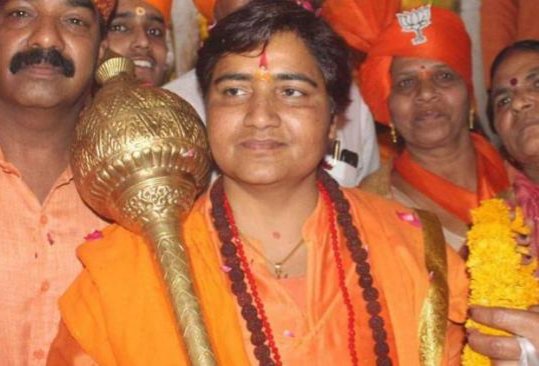Addressing a gathering of Kshatriya Sabha at Sehore, Madhya Pradesh on December 12, BJP MP from Bhopal, Pragya Thakur, while targeting the large Dalit population in the country in a surprisingly uncalled for manner, said that there are four varnas in the dharmashastras (religious texts) and that a shudra feels bad if we call them shudra! It is their misunderstanding, she added.
The BJP MP is right is saying that the varnashrama, the system that allows discrimination of one group of people from another, has its roots in their dharmashastras. For example:
“When they divided Purusa how many portions did they make? What do they call his mouth, his arms? What do they call his thighs and feet? The Brahman was his mouth, of both his arms was the Rajanya made. His thighs became the Vaisya, from his feet the Sudra was produced.”
Rig Veda Mandala 10 Hymn 90 Mantra 11-12
And the same assertion has been made in different manner in all other dharmashastras. Right from the Rig Veda period till date the Indian society has been treating with the shudras in strict accordance with this teaching. To put a stop to this discrimination meted out to shudras or the backward Dalit community and restore their human rights, the Constitution of Independent India grants special privilege and reservation facility. But Sadhvi Pragya prefers discrimination sanctioned by dharmashastras to the equality guaranteed by the Constitution of India.
The Poet of the East, Allama Iqbal, picturising this five-thousand-year old downtrodden condition of the Dalits, said:
aah shudr ke liye hindustāñ ġham-ḳhāna hai/ dard-e-insānī se is bastī kā dil begāna hai (Alas, for the shudra India is a house of sorrow,/ This land is blind to the sufferings of man.)
To blanket this pitiable historical reality, another BJP MP and party’s national spokesperson, Dr. Vijay (Bizay) Sonkar Shastri, in his total 992-page three books “Hindu Charmkar Jati”, “Hindu Valmiki Jati” and “Hindu Khatik Jati”, contrary to Sadhvi Pragya’s assertions, has concocted a tale that these three communities have been the ruling communities of the country, strong, brave, warrior, possessing extraordinary respect, honour, dignity and self-respect. He added that it was the foreign Muslim invaders who brought them down to the present downtrodden condition! The Rajya Sabha member levelled these allegations without any evidence or argument whatsoever.
These two Members of Parliament belonging to the BJP may settle whether the pitiable condition of the large population in the country is as a result of the teachings of dharmashastras as asserted by Pragya Thakur or its responsibility lies on the shoulders of Muslim invaders as claimed by Dr. Sonkar. But according to Pragya Thakur, shudras are the product of dharmashastras. And it was as per teachings of the dharmashastras that they were never given the status of a dignified human being and every kind of injustice, excess and oppression was meted out to them during the last five thousand years. The statement Sadhvi Pragya Thakur made at Sehore shows that they want the shudras of yesteryears and Dalits of today to bear with all humility all the oppressions and the treatment of inequality meted out to them, to keep quiet, not to mind these humiliations, and not to think of effecting any change in their abominable condition! Bhatko tamam umr kabhi rah per na aao (keep on wandering, never reach the destination)!
At a time when inflicting oppressions on Dalits is going on in the Shivraj Singh Chauhan-led BJP-ruled state of Madhya Pradesh, Pragya Thakur, having varna-ashrami mentality, thought it necessary to teach the Dalits the lesson of ‘not to feel bad’ even if they are subjected to all sorts of humiliations. Only a few months ago, making a Dalit family of Guna in Madhya Pradesh target of their brazen cruelty and barbarism, the police beat them with lathis, punches and boots; a Dalit woman of the family was dragged and assaulted, leaving no stone unturned in implementing the teachings of Manusmriti. Later the SP and Collector of Guna were suspended. But the billion-dollar question is: Did this suspension compensate the perpetration of barbarism by the police against the Dalit family? Also, there is a question: Why did the police of Shivraj Singh administration practise this inhuman and anti-Constitutional treatment with regard to the Dalits? Was Pragya Thakur, Member of Parliament elected from the same state Madhya Pradesh, not aware of the police barbarism done to the Dalit family of Guna? If yes, did she go to the village of the Dalit family and the house of the Dalit woman to render justice to them? Perhaps Not! Even the oppressions committed against a poor Dalit woman did not melt Sadhvi Pragya.
But Pragya had an opportunity to compensate it, at least to some extent, when she was addressing a Kshatriya Sabha at Sehore on December 12. Inspiring the Kshatriya community towards its traditional strength and bravery, she could have invited its members to form a delegation of the Sabha to accompany her to Guna to extend sympathy to the Dalit family and make every possible effort to render justice to the victim family. But perhaps the Sadhvi had no softness and compassion in the heart, and instead of doing her duty of making her human and public representation she having inflicted one more wound to the Dalits concluded her research of their ‘misunderstanding’ and also made it public.
Dil bahar-haal na tha tum saa si’tam-gar yaro /Tum ne kis shahr per barsaye paththar yaro (My heart was in any case not oppressive like yours, O my friends /Which township you pelted stones at, O my friends).
[The writer is President, Islami Sahitya Trust, New Delhi]


